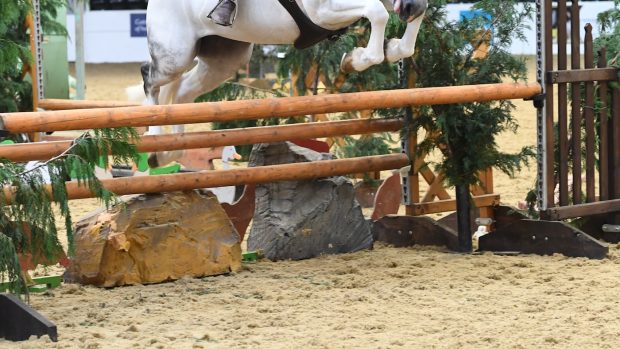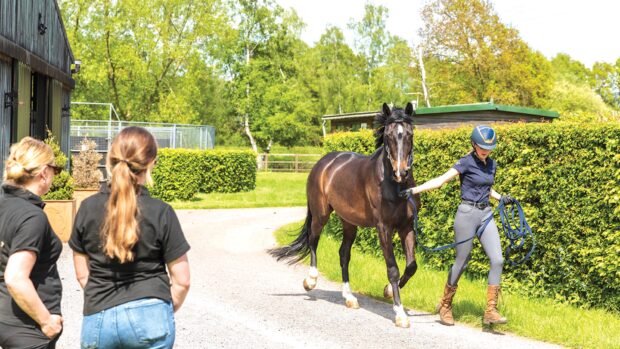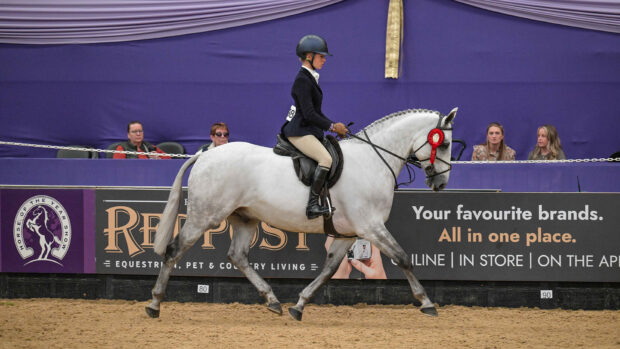If you’re hoping to jump in the show ring next season and beyond but don’t currently have the ride to do so, then this guide on how to buy a working hunter is a good place to start.
What is a working hunter class?
Working hunter classes are one of the most popular sections within showing with both competitors and spectators alike. A working hunter class is judged in three phases, the first being a jump round over a course of rustic fences. The style and performance mark from this phase is then added to the points given by the ride judge for the ride, and the points accumulated in the conformation phase. While the jump phase is worth 60% of the final score, horses must be conformationally correct as well as comfortable, mannerly and balanced in the ride to score highly when the judge gets on board. The combination with the highest final score wins the class.
There are different levels of working hunter classes, ranging from unaffiliated to national finals found at the two major showing championships, Horse of the Year Show (HOYS) and the Royal International (RIHS). The quality, scope and price of the working hunters you will be looking at on your search will be dependent on the level you are hoping to compete at.
If you are aiming to ride at the highest level, then a former successful show hunter with a jump might be a better option for you. If you are looking to compete on the local show circuit, you could prioritise jump over conformation and show quality, as long as the horse is still to hunter type and is sound, fit and honest.
It’s important to note that in working hunter classes that are affiliated to the main horse societies, Sports Horse Breeding of Great Britain and the British Show Horse Association, any horse that is ranked as a grade A showjumper or advanced event horse is not eligible to compete.
What type of working hunter should I buy?
The exact type of working hunter you will be looking to buy will largely be down to personal preference, however there are a few key elements that should be considered irrespective of type. In brief, a working hunter should be a show hunter with a jump.
“Everyone has their own ideal horse, and my idea of the perfect top-class worker might not be the same as the next person,” confirms leading working hunter producer Kelly Ward of Noble Sports Horses. “While a lot of it comes down to personal preference, any working hunter should be conformationally correct and should be a nice quality show horse, not just a jumping horse dressed up to go into the ring. I don’t agree with those who assume a jumper will be a successful worker just because it will jump the course; it also needs to be a good stamp of a show horse.”
Horses usually compete together or in separate lightweight and heavyweight sections, so ideally you will know what section the horse will jump in depending on how much weight the horse can carry, identifiable by the amount of bone, substance and body said horse has.
Katrina Braithwaite is a leading working hunter competitor who has won the RIHS on several occasions.
“Personally, I like working hunters to have at least 50% Irish Draught breeding in them as I find it gives them a more trainable temperament and a level head,” says Katrina. “As I am the driver, rider, trainer and groom, I need something that is relatively easy to work with. Plus, when you get to the big county shows a horse needs to be able to cope with the atmosphere, so temperament is very important.”
What height of working hunter should I buy?
When it comes to height of the horse, this will first and foremost depend on the size and build of the rider. According to the BSHA and SHB (GB) rule books, working hunters must exceed 148cm (14.2hh) and there is no maximum height.
Kelly says that when it comes to talent and scope you shouldn’t just assume that bigger is better. Good working hunters come in all shapes and sizes.
“The 2023 HOYS working hunter champion (Bellvue Tomboy) is just a little 15.2hh horse,” she says. “While you might not bill a smaller horse as an ideal worker, many of them are powerful jumpers who are capable of taking on the height and doing the job, so don’t write them off.”
What should I look for when buying a working hunter?
It will largely depend on if you are hoping to purchase a young prospect or a horse which already has experience in the ring. When buying a younger horse which doesn’t have established form, you can look at the breeding to assess if it has a pedigree which lends itself to jumping. Assessing the horse’s conformation and paces, as well as its talent over a fence while loose in the arena, can go someway in assessing if the horse has a future in a certain sphere, though it can still be a gamble as each animal is an individual with unique talent.
When looking at older horses there are many factors to consider, as Kelly explains.
“As well as looking at the horse’s form, take into account the rider who has been competing it previously. You have to be realistic and ask yourself if you have the same abilities as the former rider. Perhaps the rider kept the horse in a certain way that you might not be able to replicate as it does not fit into your own routine and lifestyle, especially if you’re keeping the horse at home and fitting it into a busy life. Working hunters can take a lot of production so ensure you’re being realistic. Ultimately, you need to make sure you can ride the horse, so do your homework.”
Katrina adds: “Of course, they have to have scope and jump, and they have to move. Today, a working hunter has to have everything, including that look-at-me quality. Otherwise, you’re never going to get that top pull in a class of 20-odd horses.”
What about blemishes and injuries?
“When looking from the ground up, I ensure the horse has good feet and a good amount limb,” Katrina says. “If a working hunter had a genuine blemish that wasn’t upsetting to the eye, such as an old overreach scar or a tiny mark on the limb, I would not write it off. After all, they are working horses. I wouldn’t buy a horse with a conformation fault, or a horse that had sustained a horrific injury in earlier in life. But, a superficial blemish that does not affect the horse in anyway is passable.”
Where should I buy a working hunter from?
Working hunters for sale will be advertised at various times in the season on online platforms, but they are also often sold via word of mouth.
“Sometimes, the harder you look for the perfect horse, the less chance you have of finding it,” Kelly says. “Lots of people discover their next horses while out and about on the circuit and if you have the budget to do so, it can be easier to approach the owner of a horse you like to start a discussion about a potential sale. A lot of people will sell their horses for the right price, especially if they are professionals who are well-known for producing horses through the ranks.”
Katrina adds: “A lot of my horses have come from someone I trust via word of mouth. I have bought horses unseen before, but it’s always been from someone I have complete confidence in, so I’m not buying completely blind. Have an ask around, too; the horsey world is small and someone will probably know of the horse or the seller.”
How do I know if the horse is for me?
Ultimately, only you know which horse is the right fit for you, and you should ask yourself a few questions before you agree on a sale.
“It’s vital that you keep the horse within a reasonable distance from your home so you can build a strong partnership with it,” Katrina says. “You will need to make sure you spend time getting to know each other, as you have to have an exceptional amount of trust in each other when coming into some of these fences.
“You don’t necessarily need an arena. You can bond and school while out hacking, and when the season is approaching you will need to get out and about to arena hires. Ask yourself is you’re committed enough to the process.”
How much should I pay for a working hunter?
Budget is hugely personal and it also depends on the time of year and the current market.
“If you’ve got a nice, genuine, established open horse to sell then you can pretty much name your price as they are so hard to find,” says Kelly. “By the time you’ve produced a working hunter to top level over two to three years you’re probably not even making that much money out of it anyway. You have to ask a decent price to make the whole process worth it.
“If you’re buying a young horse at a sale, you’re more likely to find a bargain as the prices are dependent on what is being paid on the day. Though the sales market is unpredictable; sometimes you will feel you’ve paid enough for a horse, while other times you will feel like you’ve stuck lucky and got a gem for a very fair price.
“Horses aren’t cars and there isn’t a set rule dictating how much you should pay. Sometimes circumstances mean a horse is being sold for a lot of less money, sometimes sellers will hold out for a strong price as they have time to do so. But generally, if you have a nice working hunter, whether it a 133cm or a horse worker, you can command a good price for it.”
What happens when I’ve agreed to buy a working hunter?
When you have agreed on a sale, it is time to organise a pre-purchase vetting, something that is strongly recommended.
The vet will assess the horse with the specific job you want it for in mind, so it’s important to let the vet know prior to the vetting that your main goal is to compete it as a working hunter. If you tell the vet that you want the horse for the show ring, they should hopefully inform you of any blemishes or conformational faults which could impact its future career, even if they don’t impact its soundness or performance.
“I would always have a five-star vetting, and if money allows, I would ask for X-rays of both the hocks and feet,” says Katrina. “If you were buying a younger horse, say an unbroken three-year-old, a two-stage would do the job, but I would still request X-rays.”
For more information, you can read H&H’s ultimate guide to buying a horse.
- To stay up to date with all the breaking news from major shows throughout the season, subscribe to the Horse & Hound website
You may also be interested in:

How to buy your ideal all-rounder

How to buy your perfect dressage horse

How to buy an eventer: what to look for

Subscribe to Horse & Hound magazine today – and enjoy unlimited website access all year round




